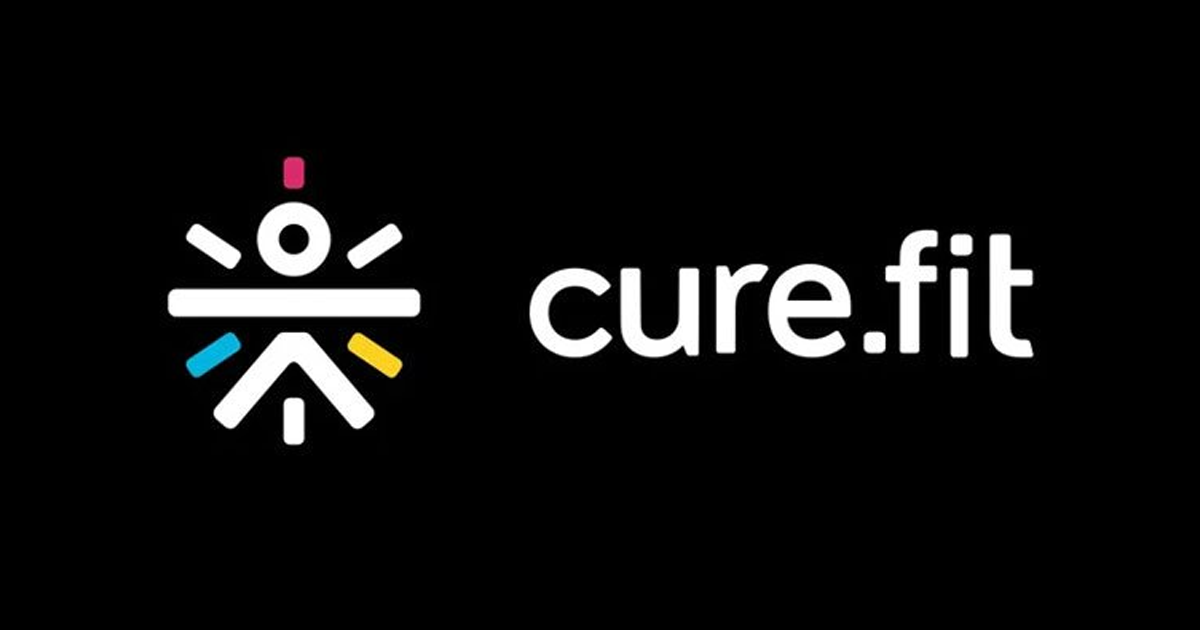Emerging Startup Stories
Cure.fit – How This Startup Is Revamping The Idea Of Fitness

Fitness is an important aspect which tends to get overlooked in the current age. With millennials reluctant to go to a gym or a park to workout and with the availability of fast food at the touch of a button, fitness is more important than ever before. With famous chains such as Talwalkars, Gold’s Gym and Reebok Crossfit already existing in the market, a relatively new player, Cure.fit, took the industry by storm and disrupted it by providing services none of the existing players provided.
Founding of Cure.fit
Cure.fit was founded by Mukesh Bansal and Ankit Nagori in 2016. Mukesh Bansal is well known for founding the startup Myntra, which turned out to be highly profitable in the online fashion segment before being acquired by Flipkart. After the acquisition of Myntra, Mukesh Bansal took up the role of Head of Advertising Business & Commerce. After a stint at Flipkart, both Mukesh Bansal and Ankit Nagori decided to venture into the fitness industry, which was at a nascent stage at the time, by combining technology and service.
The number of apps is increasing every day as there is an app for every small service. The founders realised the need for aggregating multiple offerings on the same platform, eliminating the need for multiple applications on a mobile phone and offering a well rounded approach to healthcare and fitness.
Offerings
Cure.fit currently has 4 business verticals, which are Mind.fit, Cult.Fit, Eat.Fit and Care.fit. Cure.fit offers subscription models, wherein users can opt for either of the four offerings or all of them. Mind.fit offers mental wellness programs, Cult.fit offers physical wellness programs like zumba, yoga, weight lifting, martial arts and boxing. Eat.fit offers curated meals which are calorie counted to complement a weight loss or weight gain journey. Care.fit offers access to trained healthcare professionals.
Growth
The startup initially started out small and in Bengaluru, Karnataka, India. It slowly grew by acquiring and partnering with multiple small firms along the way to grow into what they are now. The startup is now located at multiple locations in cities like Bengaluru, Hyderabad, Mumbai, Delhi, Chennai and Pune, to name a few. Cure.fit also focuses on customer experience by integrating technology and human experience. For example, users can now book a time slot to attend their workout or order food online via the app. Competitive price offerings with discounts encourage their audience to opt for either a six or a twelve month subscription.
During the initial days of their growth, Cure.fit relied heavily on celebrity endorsements. It was easy to spot posters of well known Bollywood actors Hrithik Roshan and Tiger Shroff and Indian cricketer K.L Rahul. These endorsements went a long way in cementing the position of their brand.
This fitness startup, which is still growing at a rapid pace, shows no signs of stopping anytime soon. Cure.fit is making a visible change in how working professionals approach physical activity and fitness.
Read about how Bounce Bikes is changing the way we commute: Bounce : How The Bike Rental Startup Is Changing The Way We Commute
Emerging Startup Stories
WhatsApp’s Bharat Yatra: Empowering Small Businesses Across India!

WhatsApp has embarked on a nationwide initiative called Bharat Yatra to empower small and medium businesses (SMBs) across India. This innovative mobile bus tour aims to provide hands-on training and support to help businesses leverage the power of digital technology, particularly through the WhatsApp Business app.
Key Focus Areas
- Digital Skill Enhancement: The Bharat Yatra program is designed to equip SMBs with essential digital skills necessary to thrive in the digital age. This includes training on how to effectively navigate the digital landscape and utilize online tools for business growth.
- WhatsApp Business App Training: Participants will learn how to use the WhatsApp Business app to connect with customers, share product catalogs, and manage inquiries efficiently. This training is crucial for businesses looking to enhance customer engagement and streamline communication.
- Latest Features and Updates: The tour will highlight the latest features of WhatsApp Business, including Meta Verified, which enhances business credibility, and custom messaging options that allow for personalized communication with customers.
- AI Integration: Businesses will also be introduced to the potential of Meta AI integration, which can streamline customer engagement processes and boost overall productivity. This aspect of the training aims to familiarize SMBs with advanced tools that can enhance their operational efficiency.
Tour Details
The Bharat Yatra will kick off its journey in Delhi-NCR, visiting bustling markets such as Laxmi Nagar, Rajouri Garden, and Nehru Place. Over the coming months, the bus will cover key business hubs in cities like Gurugram, Noida, Agra, Lucknow, Indore, Ahmedabad, and others. Each stop will feature interactive demos, expert guidance, and personalized support tailored to the unique needs of local businesses.
Impact on the Indian Economy
By engaging directly with businesses across major cities, WhatsApp aims to create a tangible impact on the Indian economy. The initiative aligns with WhatsApp’s broader goal of supporting small businesses and fostering digital growth in India. According to Ravi Garg, Director of Business Messaging at Meta India, “Small businesses are the backbone of India’s economy, and with the right digital tools, they have the power to supercharge the country’s digital transformation.”
Conclusion
As the Bharat Yatra continues its journey across India, it is expected to empower thousands of SMBs, contributing significantly to India’s economic development and digital transformation. By providing essential training and resources, WhatsApp is not only enhancing business capabilities but also reinforcing its commitment to fostering a robust small business ecosystem in India. This initiative builds on previous efforts such as WhatsApp Se Vyapaar, which aimed to upskill millions of traders, further demonstrating WhatsApp’s dedication to supporting India’s entrepreneurial landscape.
Emerging Startup Stories
Discover Kheyti, The Startup Changing The Lives of Farmers In India

Farming has been an integral part of India’s history and culture for ages. It’s been the foundation of the Indian economy, supporting millions of people with food and jobs. Crops and agriculture hold immense importance in Indian society, not just in terms of money, but also in terms of culture, community, and spirituality.
Farming is a way of life for many people in India, but it can be a difficult and unpredictable business and farmers face a number of challenges, from erratic weather patterns to low market prices for their crops. Kheyti is a social enterprise founded in 2015 by Saumya, Kaushik Kappagantula, and Sathya Raghu. The organisation provides sustainable solutions to small farmers in India, helping them overcome challenges and improve their lives.
Kheyti’s flagship product is the “Greenhouse-in-a-Box,” a low-cost modular greenhouse that allows farmers to grow high-value crops year-round, even in unfavourable weather conditions. operates on a subscription-based model, where farmers can purchase a “Greenhouse-in-a-Box” kit or sign up for crop advisory services on a monthly or annual basis. Kheyti.com also earns revenue by connecting farmers with markets and buyers, taking a small commission on sales. They work to keep the costs low by partnering with local manufacturers to produce their products and leveraging tech to provide personalised crop advisory services at scale.
They also provide crop advisory services to farmers, offering personalised advice on crop selection, planting, and management. In total, The company has helped over 6,000 small farmers increase their incomes by an average of 300%. You call them small farmers, Kheyti calls them Smart farmers!
While there are other companies in India that offer similar solutions to small farmers, Kheyti stands out for its focus on sustainability, innovation, and community involvement. It works closely with farmers to develop tailored solutions that meet their needs while focusing on sustainable farming practices. Through its efforts, Kheyti has improved soil health, reduced water usage, and increased yields of various crops.
Looking ahead, Kheyti plans to expand its reach to more farmers in India and beyond and aims to continue developing new products and services that can help small farmers overcome the challenges they face. With its commitment to sustainability and innovation, The visionaries at Kheyti claim it has the potential to transform the agricultural sector and contribute to a more equitable future for all.
Imagine the joy and hope Kheyti brings to struggling farmers in India. With Kheyti’s help, over 6,000 small farmers have transformed their lives, becoming Smart farmers who handle challenges and succeed. With sustainable solutions, Kheyti is not only revolutionising agriculture but also spreading hope for a brighter future.
Emerging Startup Stories
Suki: This Startup Wants To Transform Healthcare With Its Artificial Intelligence Tool

We live in a rapidly transforming era where humanity is making exponential leaps in technology. Thirty years ago, no one would have believed you could talk to an online voice assistant to create tasks and get things done. Ten years ago, no one would have believed humanity would land robots on Mars. Technology truly has improved the quality of living of every human who owns a smartphone and has access to an internet connection. Voice assistants are slowly replacing manual tasks and making lives easier and efficient. Siri, Alexa, Google Voice Assistant are just some of the widely used artificial intelligence based tools which are employed on a daily basis. Artificial intelligence, which is hailed as the technology of the future is now slowly making its way into much more complex domains like self driving vehicles, quantum computing and also health care.
Suki, a United States of America based startup founded by Punit Soni, developed their own voice assistant which runs on artificial intelligence to simplify healthcare for doctors and other healthcare professionals. In simple terms, Suki is akin to Siri for doctors. While you could order a pizza or schedule an appointment on Siri, doctors could modify, edit and add health records of their patients. Suki is a powerful tool to help doctors with documentation of health records which often take hours of their (doctors) time.
Suki currently focuses on documentation but has the potential to expand its usage to data queries, ordering, prescribing and billing. According to a white paper published by Suki, using its technology increases the time a doctor spends with a patient by 12% by cutting note taking time by 76%. The time which is saved also brings in a financial benefit of $30,000 more in revenue a year on average for doctors.
Suki raised a $ 20 million Series B round from Flare Capital Partners, First Round Capital, and Venrock, doubling its total funding to $ 40 million since its 2017 launch. Suki is also looking to expand its reach in India and has decided to establish Bangalore as their base of operations. India holds a lot of potential for Suki considering the amount of manual work which goes into almost any sector.
It would be interesting to watch how Suki and other similar AI based startups would transform healthcare across the world.













antibiotic augmentin from mouth
April 29, 2025 at 1:45 pm
Since toremifene is less toxic in high doses than tamoxifen, in many clinical studies 200 mg daily doses are used dosage augmentin
y8xtu
June 7, 2025 at 4:16 am
clomid prescription cost can i order clomiphene prices clomid sleep apnea clomid tablete can i buy clomid no prescription can you get cheap clomiphene without insurance cheapest clomiphene pills
Kuwin
November 8, 2025 at 6:14 am
kuwin sở hữu kho game đa dạng từ slot đến trò chơi bài đổi thưởng, mang đến cho bạn những giây phút giải trí tuyệt vời.
ios超级签
November 10, 2025 at 4:21 am
苹果签名,苹果超级签平台,ios超级签平台ios超级签苹果企业签,苹果超级签,稳定超级签名
MM88
November 12, 2025 at 11:05 pm
Với giao diện mượt mà và ưu đãi hấp dẫn, MM88 là lựa chọn lý tưởng cho các tín đồ giải trí trực tuyến.
谷歌外推
November 13, 2025 at 11:06 am
采用高效谷歌外推策略,快速提升网站在搜索引擎中的可见性与权重。谷歌外推
iwin
November 15, 2025 at 11:49 pm
iwin – nền tảng game bài đổi thưởng uy tín, nơi bạn có thể thử vận may và tận hưởng nhiều tựa game hấp
GO88
November 17, 2025 at 7:28 pm
Tham gia cộng đồng game thủ tại Go88 để trải nghiệm các trò chơi bài, poker phổ biến nhất hiện nay.
MM88
November 22, 2025 at 10:33 pm
Khám phá thế giới giải trí trực tuyến đỉnh cao tại MM88, nơi mang đến những trải nghiệm cá cược thể thao và casino sống động.
J88
November 29, 2025 at 6:17 pm
Đến với J88, bạn sẽ được trải nghiệm dịch vụ cá cược chuyên nghiệp cùng hàng ngàn sự kiện khuyến mãi độc quyền.